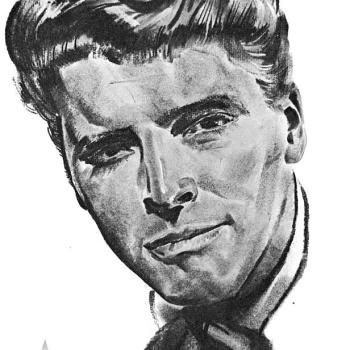Following the famed Scopes Trial (and pursuant an increasingly pre-millenarian eschatology), American fundamentalist Christians had become less politically active. This would begin to change about the same time conservatives (both religious and not) sought to cohere into a politically viable coalition. Billy Graham, with his mixture of charisma, savvy, and commitment to worldly improvement, is often seen as the man who “re-politicized” evangelical Christianity. Catholicism was not too far behind. How, then, could such Christians be both dedicated to shaping the world and opposed to the machinations of the state?
One common argument (you guessed it) formed: Christianity is about conversion of the heart, not the restructuring of the world. In fact, such a commitment to what’s “out there” can be distracting! Only by winning hearts can there even be a hope (if that) of winning changes in the world itself. All is vanity, after all. This angle is still with us. When you see arguments for “Christian liberty” or see the abstract criticism that “fake Christians” thing Christianity is just about good deeds—these are downstream manifestations of the same point.
In recent years, we have even seen a more subtle form in the new Integralism. Figures like Sohrab Ahmari and Adrian Vermuele have argued that—contra the old conservative Christianity—the state can and should be used to shape people and ends. Most negative responses to these ideas center on the possibly authoritarian consequences of such logic. My point, however, is that this new integralism is nothing more than this same old body-spirit argument repackaged and resubmitted for your approval.
Rushdoony and North, for example, were theocrats; they were just small-government theocrats, people who believed that human beings prospered best (and could best live in accordance with so-called “Biblical Law”) in the absence of government coercion. Christianity works on the spirit; this, in turn, may produce effects in the material world. If it does so, wonderful—but they key is that such conversion must always be prior to any hope of outside betterment. How different is this from Marco Rubio, now a freshly-minted integralist, saying things like this while in no substantive way offering policy changes from the old paradigm?
[We should not] judge the well-being of the economy by how the stock market is performing. For the past six months, the stock market has had some really good days—and that in no way aligns with what everybody else in the country is going through. It is possible to have a roaring stock market, and you have millions of people who aren’t just unemployed, they may be permanently unemployed. (Senate.gov)
At bottom, my goal here is not to attack the new Integralists, nor is it to poke fun at Rushdoony or Rubio (in fact, after reading a book about the former, I feel a certain affinity for him, a sense of respect, even though I think many of his ideas are off the wall). No—my hope is to make you, dear reader, aware of the ways in which specific principles, often baked into our thought, left totally unquestioned, can have outsized downstream effects. Many of us, whether we realize it or not, nod our heads to the idea that Christianity is always and everywhere primarily about the soul, not the body, primarily about forming persons rather than societies, as if people could be disconnected from their surroundings, turned into absolute monads of spiritual development, re-released into the world of phenomena when ready to live Christian lives.
Our politics must always be of both the body and the spirit. Just as we human beings are neither just souls in flesh suits, nor bodies lazily animated by divine static, so our actions in this world must intend to heal both the inner and outer lives of our fellows. To lift a person out of poverty, to comfort a victim, to visit a prisoner—each of these illuminates the world in the blaze of the Holy Spirit. We also pray for these people and many more; we sit in silence and pray to know and feel God’s love in ourselves. There are, after all, both spiritual and corporeal works of mercy.
In departing for now (and in the hope of writing more soon), I leave you with Simone Weil:
In depicting it, one nearly always pretends that abasement is innate in the unfortunate or that the soul may endure misfortune unscathed, without its thoughts being uniquely altered. (“The Iliad or the Poem of Force”)
This life is filled with pain and suffering, trauma and grief. These are never inevitable, nor are they merely erasable. Too often we seek to explain them away in mystical ecstasy or fetishize them through some victim-soul theology. But our faith is not so neat: its extension into the social world sees suffering everywhere, to be alleviated, to be reflected upon—to be embraced in a politics of body and spirit.













